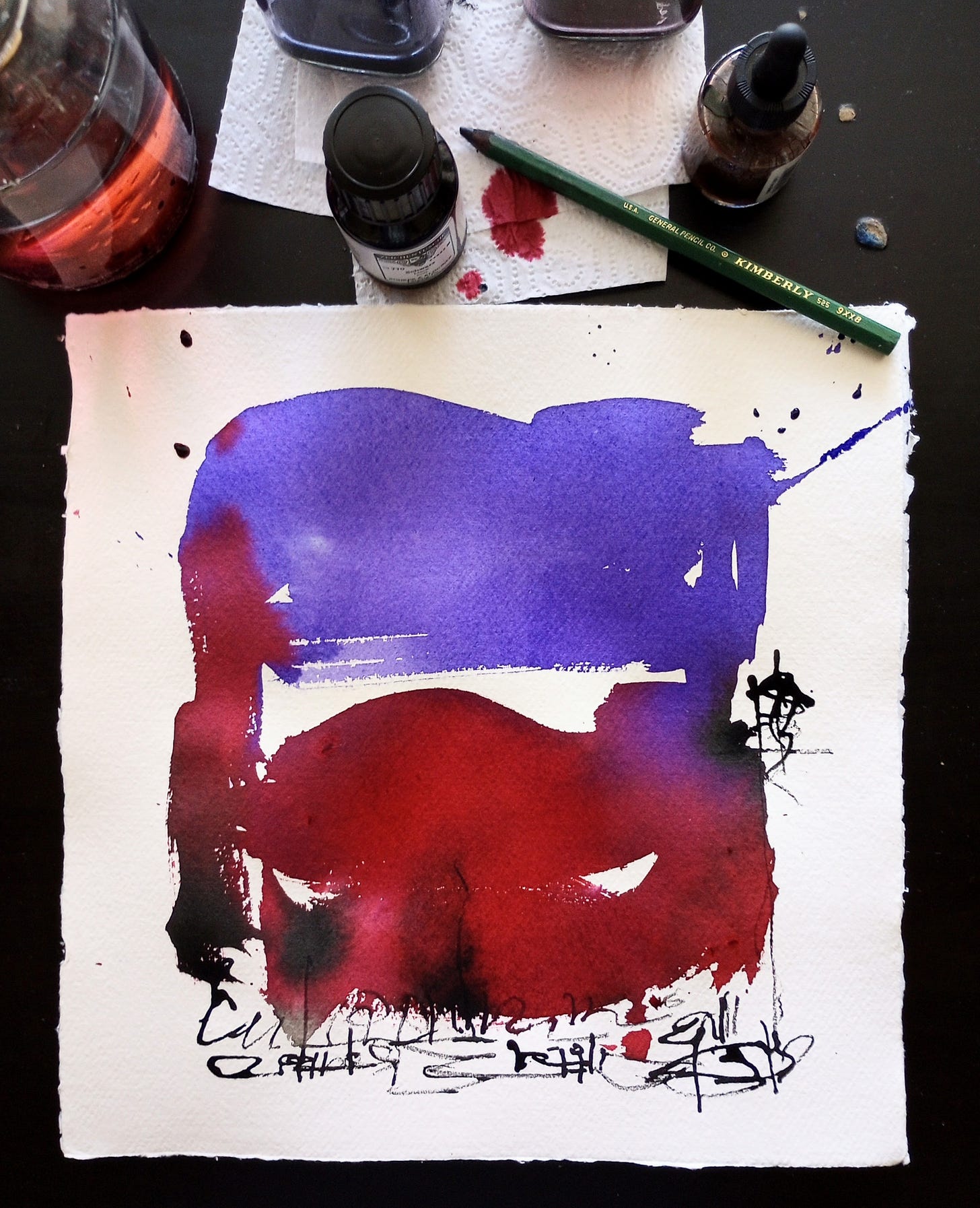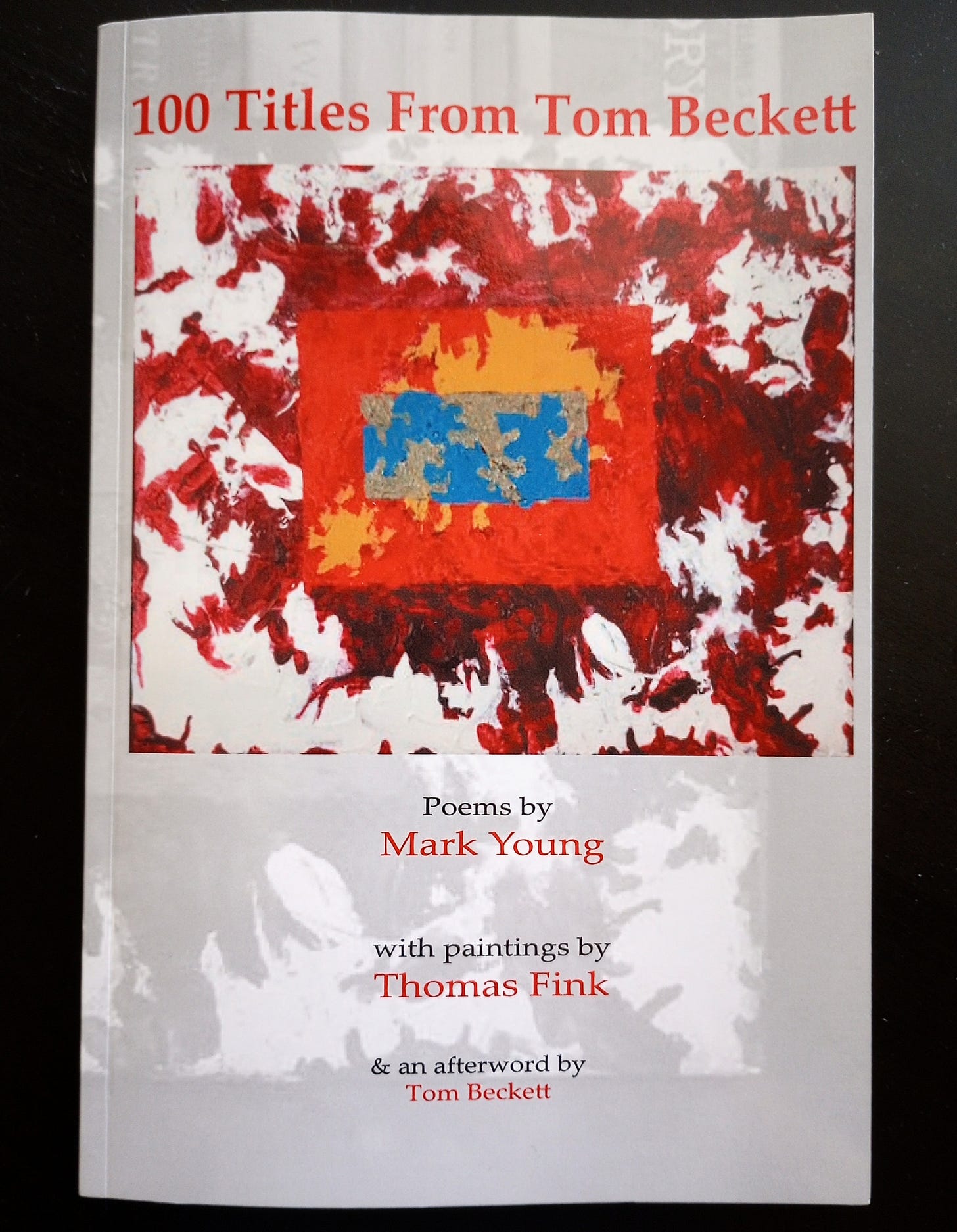This is a Spell
#157: Acknowledgment (Spell), Asemic Art, Sal Randolph, Tim McFarlane, Stella Kalaw, Shinichiro Sakamoto; Tom Beckett, Mark Young, & Thomas Fink; Sam Roxas-Chua, and Lindenberg Munro/Aarvo Part
THEN & NOW
To include, in Eulipion Outpost, a section on my parents’ WWII letters (which I’ve been writing about for the past few issues) is to acknowledge, not just my parents and their DNA in my blood, but the family and ancestors that have come before me and the land and seas from which they sprang. It’s to acknowledge the myths, the stories, and the gossip, as well as the human relations, the wars and migrations, and the economic and political systems within which the family, and I, have existed.
While my parents and grandparents often toiled at tedious and back-breaking jobs—I’ve already mentioned the agricultural work, galley work, the canneries and laundries—they also had creative impulses, which I picked up on as a child.
My grandfather and granduncle were both musicians, as was my father. Dad worked as an intern painting signs for a graphic artist—before he sought his fortune in the United States, where his destiny was to be a ship’s cook and steward. Mom excelled at dressmaking, and brought that skill to the U.S. where, between stints of cannery work, she sewed ballroom gowns for her friends, and brought me with her to fabric stores to help her choose brocades, satins, sequins, and buttons for her designs.
All that said, I’m taking a break from the letters for this issue!
In a society that’s currently being shaped by social media and the pressures of societal gaze, I have long struggled with the “shoulds” of art, often without realizing it; prescriptions seem to constantly enter my consciousness and subconsciousness; it’s why I continue to meditate despite my lack of diligence. If nothing else, it helps me remember to pay attention, and to not take my “self” too seriously.
And I think I owe it to the hard-working generations that came before me to exercise my ability to play freely with my art; to not work self-consciously, as if there is a teacher, marketing professional, or even a well-intentioned friend leaning over me with opinions. The ability to experiment and play is a strength, a freedom, a countering of all the imposed systems that we experience in our lives.
ART
Speaking of play, I’m back to doing asemic writing. These are “letters,” of a sort, but without writer-intended meaning. Asemics, like the one below, can happen very fast—one of the things I love about them. But they can also happen very slowly and deliberately! The one below was made with two kinds of berry ink bought locally from a shop on Custom House Plaza in Monterey. No, the pencil is not bleeding; the asemic writing was done with a favorite pencil sacrilegiously dipped in black Rohrer & Klingner ink.

RABBIT HOLE
Three Artists on Substack:
The title of this issue was inspired by the poem “A Spell for You” by experimental artist, poet, and senior zen student Sal Randolph. Read the poem, and you may understand why it resonates with me. See also their article “Recommending Poeming for All People.”
Artist/painter Tim McFarlane on cats in the artist’s studio (and more). Below, he discusses his creative process. I like his attitude and approach to art, expressed in the articles in his newsletter Tim McFarlane Studio: Art & Life Stirred Vigorously:
Collage artist and photographer Stella Kalaw’s Substack is Sundays with Stella. I’m kind of hypnotized by her color palette. But her writing is also fun and unpredictable. And here’s a short video featuring her photography “Meditations”:
I don’t often include the art of cooking in this newsletter, but this video caught my eye and senses (and hunger): Shinichiro Sakamoto owns and cooks for Ryokan Sakamoto (Sakamoto Guesthouse), also known as the smallest Ryokan in Japan. He brings an artist’s sensibility and commitment to this project. From Eillyhustlehard Films:
I received this beautiful book in the mail: 100 Titles From Tom Beckett, a collaborative project featuring poems by Mark Young and paintings by Thomas Fink, with an afterword by Tom Beckett. A little confused? The work by Young and Fink are responses to Beckett’s original list poem, “One Hundred Titles,” published in Otoliths sixty-four, the southern summer, 2022 issue. Receiving this book reminded me of those wonderful days when I was first discovering the freedom—as well as the oddly freeing constraints—of the experimental poetry community online.

SOUNDINGS
Is the gesture of writing a kind of spell, even if the writing does not carry meaning? Check out the video, below, for Sam Roxas-Chua’s book, Echolalia in Script: A Collection of Asemic Writing. Lisa Gluskin Stonestreet writes:
Sam dedicated Echolalia in Script to “Those abandoned at birth.”1 Perhaps that explains the simultaneous fracture and gravity of these images of ink to paper, parchment, and scroll, the fluid, open, ceaselessly connected script tracing ink into void, juxtaposed or becoming image, or musical note, or swan, or egg, or butterfly, or moon. They are an act of affirmation and persistence, as if the line could indeed lead us forward out of the shattered past without faltering. Leading an adult-adoptee writing group, Sam once explained why he does not write ONLY poems, saying: “Asemic Writing allows me to communicate with my dead. It allows me to commune with the sacred, whatever that means for you. Asemic allows me to be vulnerable to the mysteries of self.” (From the About page of https://www.samroxaschua.com/)
Musician and artist Lindenberg Munroe’s contemplative drawing to music by Estonian composer Aarvo Part:
Munroe notes that his art work, and his interest in simple-to-complex forms is inspired by nature:
A big thanks to all of you who read Eulipion Outpost regularly, and to those who have subscribed here or donated on my Ko-fi page to support my efforts.
As always, my appreciation to the Mysterious M. for his editing.
My Links List is now on an old-school Neocities site that I built.
Eulipion Outpost is a reader-supported publication. To receive new posts and support my work, consider becoming a free or paid subscriber.
Roxas-Chua is an adoptee, born in the Philippines, adopted by a Chinese family.





Thank you, Jeanne! I appreciate this.
Jeanne, your posts are so rich with layered and interconnected meaning, threaded through with your own searching life through art. I also recently discovered the inspirational Tim McFarlane. And I love Arvo Part. A gift to my morning right here!